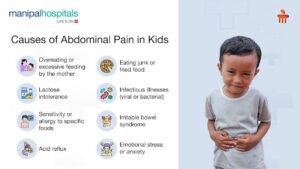Introduction

Parents and caregivers are frequently concerned about children’s gastrointestinal (GI) disorders. Digestive issues can range from minor discomforts like gas and bloating to more significant ones like chronic constipation or irritable bowel syndrome (IBS). While stomach aches are common, persistent symptoms can indicate an underlying disease that requires medical treatment.
This article will explain gastrointestinal difficulties, their causes, symptoms, and how to manage them so your child’s digestive system remains healthy and happy.
What Are Gastrointestinal Issues?

Gastrointestinal troubles encompass a wide range of digestive system problems. The digestive system covers everything from the mouth to the intestines, which aids in the breakdown of food and nutritional absorption. Children may feel stomach pain, diarrhea, constipation, or vomiting when something goes wrong with this process.
Though many gastrointestinal disorders in children are transient, persistent or severe symptoms may suggest a more serious illness.
Common Types of GI Issues in Kids

1. Constipation
Constipation is one of the most common digestive disorders in children. It happens when your bowel movements become irregular or difficult to pass. Your youngster may have fewer than three bowel motions per week and complain about firm, uncomfortable stools.
2. Diarrhea
Diarrhea is defined as frequent, loose, or watery feces. While diarrhea is typically a transient problem caused by diseases or dietary changes, chronic diarrhea can lead to dehydration and malnutrition, therefore it is critical to monitor.
3. Acid Reflux (GERD)
Heartburn and discomfort are caused by stomach acid flowing back into the esophagus in patients with gastroesophageal reflux disease (GERD), a chronic disorder. GERD affects older children as well, causing digestive distress, in addition to the occasional spitting up or vomiting that occurs in babies.
4. Lactose Intolerance
Lactose intolerance refers to the inability to digest lactose, a sugar contained in dairy products. Children with this illness may feel bloating, diarrhea, and gas after ingesting milk or other dairy products.
5. Irritable Bowel Syndrome (IBS)
IBS is a chronic disorder of the large intestine. Children with IBS may experience cramps, bloating, gas, diarrhea, or constipation. Stress, food intolerances, and hormonal fluctuations can all result in IBS symptoms.
Causes of Gastrointestinal Issues in Children

There can be several reasons why kids experience digestive problems. Here are some of the most common causes:
1. Diet and Food Sensitivities
A low-fiber diet high in processed foods might cause gastrointestinal problems. Furthermore, food allergies, such as gluten (celiac disease) or dairy (lactose intolerance), might affect digestion.
2. Infections
Viral or bacterial infections, such as rotavirus or E. coli, can produce short-term gastrointestinal symptoms such as diarrhea, vomiting, and stomach pain.
3. Stress and Anxiety
Emotional stress has a big impact on the digestive system. Anxiety, in particular, is associated with illnesses such as IBS, where stress can aggravate symptoms.
4. Dehydration
When children do not drink enough water, it can cause constipation or worsen other digestive problems.
5. Antibiotics and Medications
Some drugs, particularly antibiotics, can disrupt the balance of beneficial bacteria in the stomach, resulting in symptoms such as diarrhea or bloating.
Symptoms to Watch For:

It’s important to recognize the signs that your child may be suffering from a gastrointestinal issue. Here are some common symptoms to watch for:
- Abdominal pain: Frequent or recurring stomach aches.
- Bloating: A swollen or tight belly.
- Diarrhea or constipation: Changes in bowel movement frequency or consistency.
- Nausea and vomiting: Persistent nausea or episodes of vomiting.
- Unexplained weight loss: A significant drop in weight without any changes to diet or activity.
- Loss of appetite: A reduced interest in food, especially if accompanied by other symptoms.
Treating GI Issues in Kids

There are several ways to manage gastrointestinal issues in children, and treatment will depend on the specific problem.
1. Encourage a Healthy Diet
A well-balanced diet rich in fruits, vegetables, and whole grains can improve digestion. Increasing fiber intake can help children with constipation. If your child has dietary intolerances, consult with a doctor or a dietitian to determine safe alternatives.
2. Stay Hydrated
Water is essential for digestion. Make sure your child gets enough water throughout the day, especially if they have diarrhea or constipation.
3. Probiotics
Probiotics are helpful bacteria that can help improve intestinal health. Yogurt and probiotic supplements can help maintain a healthy balance of bacteria in the gut, especially after taking antibiotics.
4. Medication
In some circumstances, your doctor may prescribe over-the-counter drugs to alleviate symptoms, such as laxatives for constipation or antacids for acid reflux. Always consult a doctor before providing any medication to youngsters.
5. Manage Stress
In some circumstances, your doctor may prescribe over-the-counter drugs to alleviate symptoms, such as laxatives for constipation or antacids for acid reflux. Always consult a doctor before providing any medication to youngsters.
Prevention Tips for Parents

Preventing GI issues in kids often comes down to maintaining a healthy lifestyle. Here are some preventative tips to keep your child’s digestive system on track:
- Balanced Diet: Encourage a diet full of fruits, veggies, and whole grains to promote a healthy gut.
- Regular Exercise: Physical activity helps keep digestion moving smoothly.
- Limit Processed Foods: Too much sugar, fat, and processed food can lead to digestive problems.
- Monitor Stress Levels: Keep an eye on your child’s stress and anxiety, as it can impact their digestive health.
- Hydration: Ensure your child drinks enough water every day.
- CLICK HERE FOR MORE INFORMATION
Conclusion
Gastrointestinal difficulties in children are frequently painful but controllable. By learning the symptoms, causes, and therapies, parents can help their children feel better faster. Maintaining a nutritious diet, staying hydrated, and controlling stress are some of the most effective methods to avoid these problems. If the situation persists, always seek medical guidance to ensure that your child receives the necessary care.
FAQs
1. What foods help with constipation in children?
Foods high in fiber, such as fruits, vegetables, and whole grains, are great for relieving constipation. Drinking plenty of water also helps soften stools.
2. Can stress cause stomach problems in kids?
Yes, stress and anxiety can trigger gastrointestinal issues like stomachaches, diarrhea, or constipation, particularly in children with conditions like IBS.
3. How can I tell if my child has a food intolerance?
If your child regularly experiences bloating, diarrhea, or stomach pain after eating certain foods, they may have a food intolerance. Consult a doctor for testing and guidance.
4. Is acid reflux common in children?
While more common in adults, acid reflux can occur in children. If your child experiences frequent heartburn, difficulty swallowing, or vomiting, it’s important to consult a pediatrician.
5. When should I be concerned about my child’s stomach pain?
If your child has severe, persistent pain or symptoms like vomiting, fever, or blood in their stool, you should contact a healthcare provider for further evaluation.